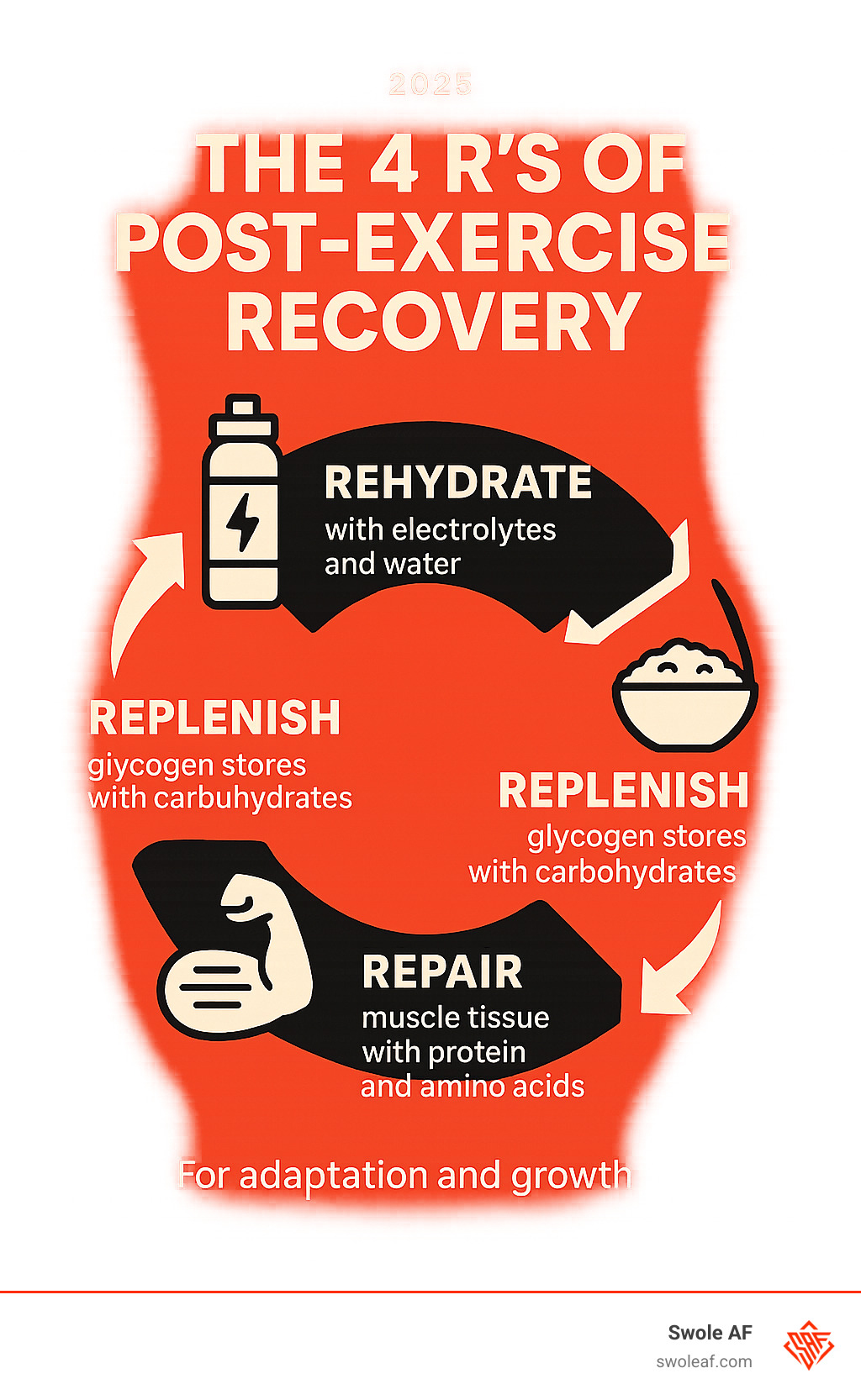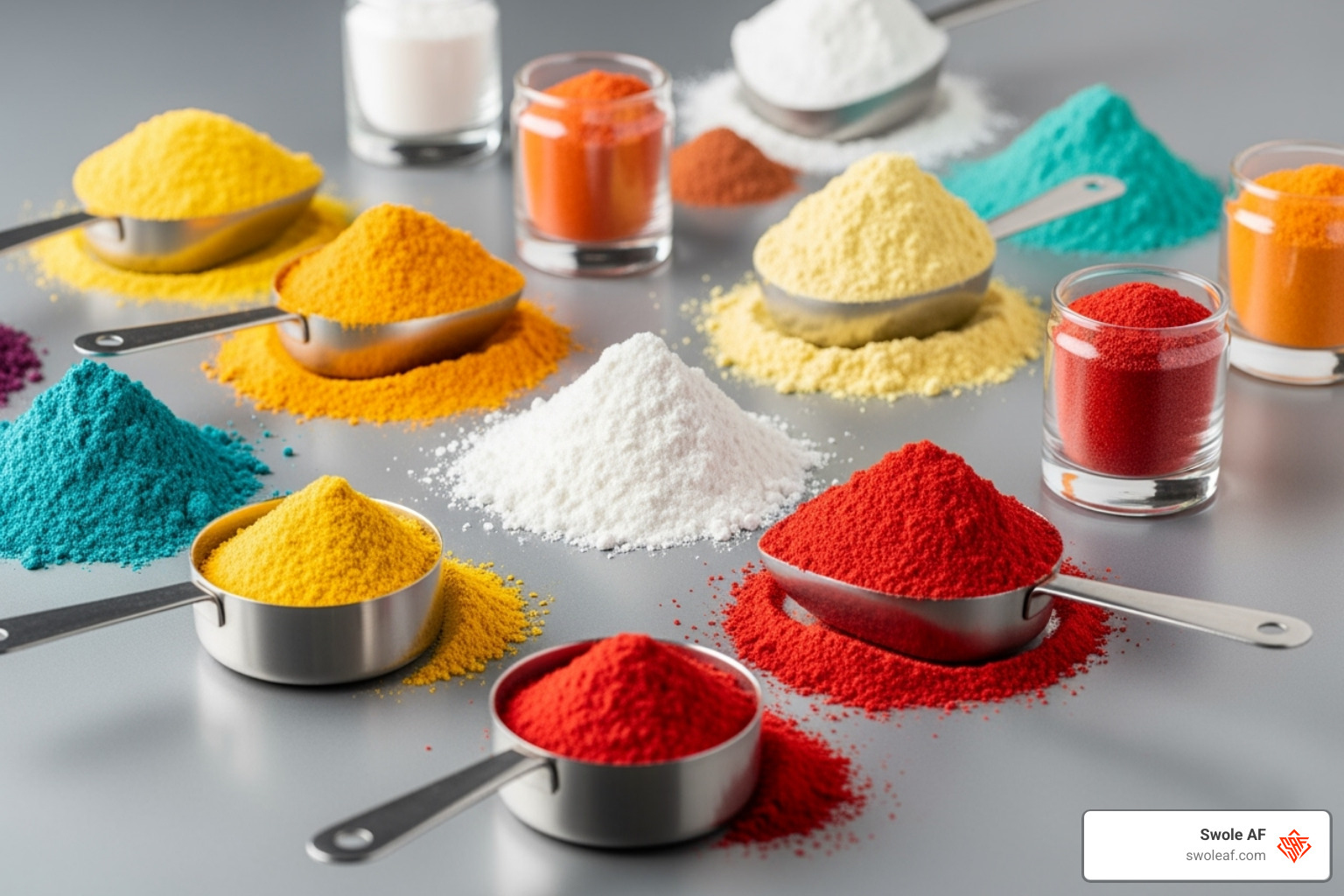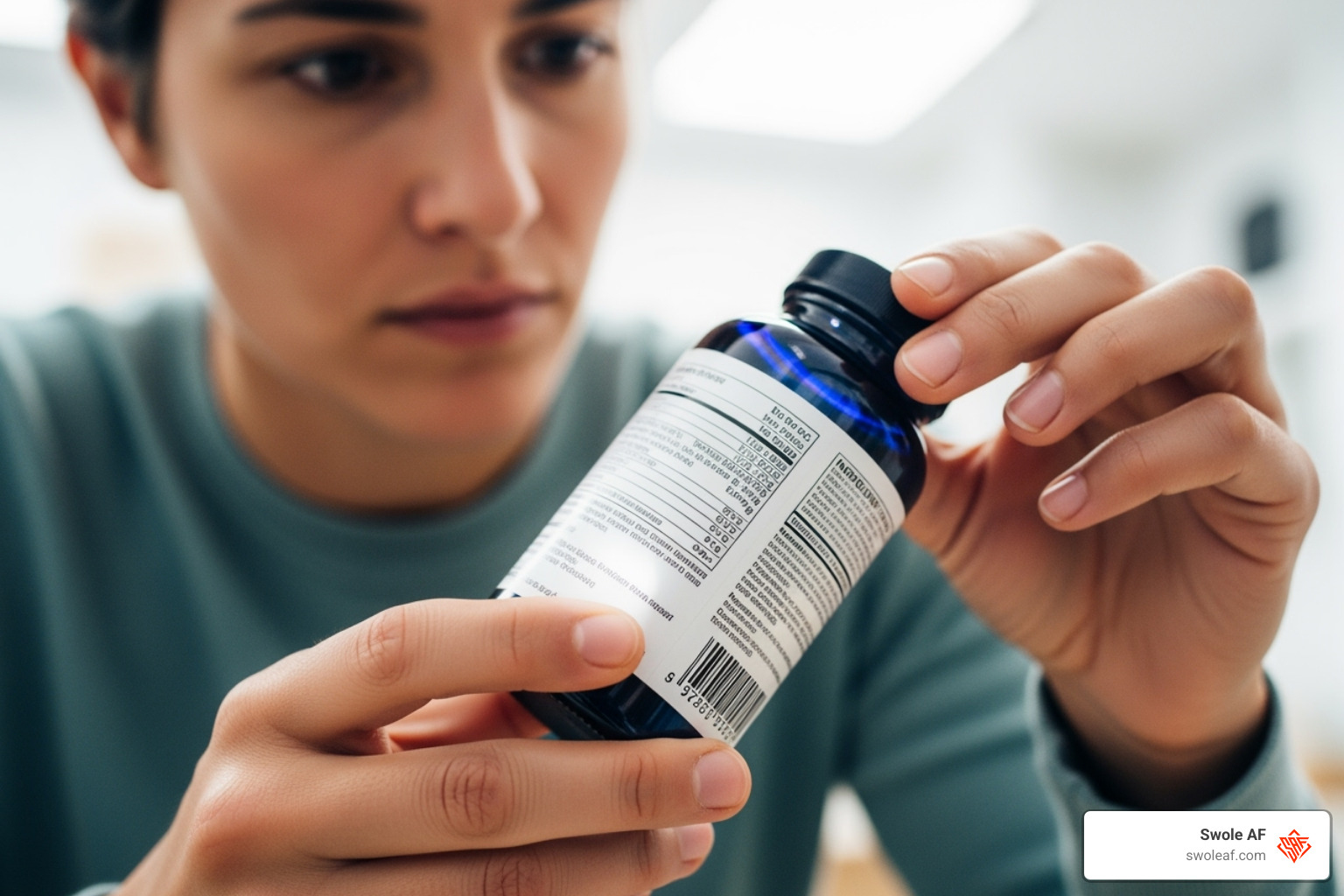Why Post Exercise Recovery Supplements Matters More Than You Think
Post exercise recovery supplements are essential tools that help your muscles repair, reduce soreness, and prepare for your next training session. Here’s what you need to know:
Top Post-Exercise Recovery Supplements:
- Whey Protein – 20-40g within 2 hours for muscle repair
- Creatine Monohydrate – 3-5g daily for strength and power recovery
- BCAAs – 5-10g to reduce muscle breakdown
- Tart Cherry Extract – 600mg polyphenols to fight inflammation
- Magnesium – 310-400mg for muscle relaxation
- Omega-3 Fatty Acids – 1.8-3g daily to reduce soreness
Every time you push through that final rep or sprint that last mile, your body pays a price. Your muscles develop microscopic tears, glycogen stores get depleted, and inflammation kicks in. This is exercise-induced muscle damage (EIMD) – and it’s exactly what triggers muscle growth.
But here’s the thing: how well you recover determines how much you actually gain from all that hard work.
The research is crystal clear. Studies show that 40-100% of trained athletes use supplements to speed recovery, reduce soreness, and get back to peak performance faster. The global sports supplement market hit $13.98 billion in 2020 and is projected to nearly double by 2027 – because they work.
Your body has four critical recovery needs after exercise:
- Rehydrate – Replace fluids lost through sweat
- Replenish – Restore glycogen and electrolytes
- Repair – Rebuild damaged muscle tissue
- Rest – Allow adaptation to occur
The right supplements can dramatically accelerate this process. While whole foods provide the foundation, supplements offer targeted nutrients at precise doses when your body needs them most.
I’m Jonas Muthoni, and I’ve spent over 15 years helping athletes optimize their recovery through evidence-based nutrition strategies. My expertise in post exercise recovery supplements comes from working with countless clients who’ve used the right combination of supplements to break through plateaus and achieve their peak performance goals.

Understanding Your Body’s Post-Workout Needs
When we engage in strenuous physical activity, our bodies undergo significant physiological stress. This stress leads to what is known as exercise-induced muscle damage (EIMD). EIMD is characterized by microscopic tears in muscle fibers, depletion of our body’s primary energy stores (glycogen), and an inflammatory response. This state of fatigue is often accompanied by muscle weakness, pain, and a reduced ability to perform subsequent training sessions or competitions. It’s a natural part of the adaptation process, but without proper recovery, it can hinder progress and even increase the risk of injury.
Beyond muscle damage, our bodies also experience significant fluid loss through sweat, leading to dehydration. This impacts not only physical performance but also cognitive function and overall well-being. Furthermore, intense exercise creates oxidative stress, where an imbalance between free radicals and antioxidants can cause cellular damage.
While a balanced diet of whole foods forms the cornerstone of any effective recovery strategy, supplements can offer a distinct advantage. They provide targeted nutrients in highly bioavailable forms, allowing for rapid absorption when our bodies are most receptive. This can be especially beneficial when we need to optimize nutrient timing to kickstart the recovery process.
The “Anabolic Window”: Fact vs. Fiction
For years, the concept of an “anabolic window” dominated post-workout nutrition. This theory suggested that there was a narrow 30-60 minute period immediately after exercise during which our muscles were maximally primed to absorb nutrients for repair and growth. Missing this window, it was believed, would severely hamper our gains.
While it’s true that the body is more receptive to nutrient uptake and protein synthesis immediately following exercise, the rigid “anabolic window” timeline has been largely debunked. Research now indicates that while consuming nutrients shortly after training is ideal, the difference between consuming them within half an hour versus, say, two hours, is often negligible for overall long-term muscle growth and adaptation. What truly matters most is our total daily intake of protein and carbohydrates. As long as our overall daily nutrition provides sufficient amounts of these macronutrients, we don’t need to stress over hitting a precise 30-minute mark.
Our practical recommendation is to consume a balanced meal or shake containing protein and carbohydrates within a few hours of your workout. This ensures our body receives the necessary building blocks and energy to begin the repair and replenishment processes.
Macronutrients for Recovery: Protein and Carbs
The dynamic duo of post-workout recovery is undoubtedly protein and carbohydrates. They play distinct yet complementary roles in helping our bodies bounce back stronger.
The role of protein is paramount for muscle repair and growth. When we exercise, especially during resistance training, we create microscopic tears in our muscle fibers. Protein, broken down into amino acids, provides the essential building blocks needed to repair these tears and synthesize new muscle tissue, a process known as Muscle Protein Synthesis (MPS). Whey protein, for example, is a popular choice for muscle recovery because it’s rapidly absorbed and contains all essential amino acids, particularly leucine, which is crucial for activating MPS.
Different protein sources offer varying benefits:
- Whey Protein: This fast-absorbing protein is ideal for immediate post-workout consumption. It’s a complete protein, meaning it contains all nine essential amino acids. Our Whey Isolate Protein is an excellent option for rapid delivery of these crucial nutrients.
- Casein Protein: Unlike whey, casein is slow-digesting. This makes it perfect for sustained protein release, providing a steady stream of amino acids to our muscles over several hours, especially beneficial before bed.
- Plant-Based Protein: Options like pea, rice, or hemp protein are great for vegans or those with dairy sensitivities. While some individual plant proteins may have less complete amino acid profiles than animal proteins, combining them or ensuring a varied diet can provide all necessary amino acids.
Carbohydrates are equally vital. Their primary role in post-workout recovery is to restore our muscle glycogen levels. Glycogen is the stored form of glucose in our muscles and liver, and it serves as our body’s primary fuel source during exercise. Depleted glycogen stores can lead to fatigue and a phenomenon athletes call “hitting a wall.”
Replenishing these stores quickly is key for optimal recovery and preparing for our next session. Scientific research on post-exercise glycogen resynthesis highlights the importance of carbohydrate intake. For individuals engaging in strenuous exercise, the International Society of Sports Nutrition recommends a daily protein intake of 1.4–2.0 g/kg of body weight/day, and a carbohydrate intake of 6–12 g/kg body weight per day after strenuous activity to restore glycogen stores.
Carbohydrates come in various forms:
- Simple Carbohydrates: These are rapidly digested and absorbed, leading to a quick spike in blood sugar and insulin. This can be beneficial post-workout for fast glycogen replenishment, especially when combined with protein to drive nutrients into muscle cells. Examples include fruit, white rice, or maltodextrin.
- Complex Carbohydrates: These are digested more slowly, providing a sustained release of energy. While less critical immediately post-workout, they are important for overall daily energy needs and sustained glycogen levels. Examples include sweet potatoes, brown rice, and whole grains.
Hydration and Electrolytes: The Unsung Heroes
Often overlooked, hydration and electrolytes are fundamental to effective post-workout recovery. We lose significant amounts of fluid through sweat during exercise, impacting our body’s ability to regulate temperature, transport nutrients, and remove waste products. Even mild dehydration can impair performance and delay recovery.
Electrolytes are minerals that carry an electric charge and are crucial for various bodily functions, including nerve impulses, muscle contractions, and maintaining fluid balance. The main electrolytes lost through sweat are sodium and potassium, but magnesium also plays a vital role.
- Sodium: Crucial for fluid balance and nerve function.
- Potassium: Important for muscle contraction and maintaining cellular fluid balance.
- Magnesium: Involved in over 300 biochemical reactions in the body, including muscle and nerve function, blood glucose control, and blood pressure regulation. It also helps muscles relax, which can prevent cramps. Roughly 50 percent of the U.S. population doesn’t get enough magnesium in their diet, and this number grows to 75 percent for women.
Symptoms of dehydration can range from thirst and dry mouth to fatigue, dizziness, and decreased performance. The American College of Sports Medicine (ACSM) position stand on fluid replacement emphasizes the importance of adequate hydration before, during, and after exercise. For exercise under an hour, plain water is usually sufficient. However, for people exercising vigorously for more than an hour, or those who sweat heavily, sports drinks containing electrolytes can be beneficial.
The Ultimate Guide to Post Exercise Recovery Supplements

Now that we understand the critical physiological needs post-workout, let’s dive into post exercise recovery supplements. While a solid nutritional foundation from whole foods is non-negotiable, strategically incorporating certain supplements can significantly improve our recovery, reduce soreness, and accelerate our progress. We’ll categorize them into foundational and advanced options, all backed by scientific evidence.
For Muscle Repair and Growth
When it comes to building and repairing muscle, certain supplements stand out for their direct impact on muscle protein synthesis and overall muscle health.
- Whey Protein: As we mentioned, whey is king for immediate post-workout protein delivery. Its rapid absorption rate means amino acids quickly become available to kickstart muscle repair. A typical dosage of 20-30g within 30 minutes post-workout is widely recommended for optimal muscle protein synthesis. Our Whey Isolate Protein is designed for exactly this purpose.
- Casein Protein: While not ideal for immediate post-workout, casein’s slow-digesting nature makes it excellent for sustained amino acid release, especially overnight. This helps prevent muscle breakdown during prolonged periods without food, contributing to overall muscle growth and recovery.
- Creatine Monohydrate: This is one of the most well-researched and effective post exercise recovery supplements for enhancing strength, power, and muscle mass. It works by increasing the availability of creatine phosphate, which is used to rapidly regenerate ATP (our body’s energy currency) during high-intensity, short-duration activities. Studies have shown that taking creatine can result in greater muscle strength during the recovery process. The International Society of Sports Nutrition position stand on creatine recommends an initial dosage of 5g four times daily for 5–7 days to saturate muscle stores, followed by a maintenance dose of 3–5g/day. Our Creatine Mono product is a pure form of this powerhouse supplement.
- Branched-Chain Amino Acids (BCAAs): BCAAs, which include leucine, isoleucine, and valine, are essential amino acids that are critical for muscle protein synthesis and reducing muscle breakdown. Leucine, in particular, is the primary driver of MPS. Studies suggest that BCAAs are among the most commonly used supplements in trained athletes. BCAAs are broken down for fuel during exercise, and supplementation may help preserve muscle mass, especially during intense workouts or calorie deficits. Positive outcomes with BCAA supplementation range from 0.087 – 0.22 grams per kg of body weight per day for at least eight days, with some studies showing benefits from 20g taken one hour prior to exercise. Our Amino AF product provides a comprehensive BCAA blend to support your recovery.
For Reducing Soreness and Inflammation
Delayed Onset Muscle Soreness (DOMS) is that familiar stiffness and pain we feel 24-72 hours after an intense workout. While a natural response, excessive inflammation can impede recovery. These supplements can help us feel better, faster.
- Tart Cherry Juice: This fruit is packed with anthocyanins, powerful antioxidants and anti-inflammatory compounds. Some exercise enthusiasts swear by tart cherry juice for full muscle recovery. A scientific review of tart cherry for recovery indicates that consuming tart cherry extract can significantly reduce measures of muscle soreness and may even help improve endurance performance. It’s suggested that a tart cherry drink containing approximately 600 mg of polyphenols should be consumed twice daily for at least 3 days prior to exercise for optimal benefits.
- Turmeric (Curcumin): Turmeric, specifically its active compound curcumin, has well-documented antioxidant and anti-inflammatory properties. Doses ranging from 1.5 – 5 grams of turmeric extract daily, perhaps with piperine (black pepper) for increased bioavailability, may be helpful in exercise recovery by reducing the perception of muscle soreness. While some literature is conflicting, numerous studies have shown its effectiveness in reducing muscle soreness.
- Omega-3 Fatty Acids: Found abundantly in fish oil, these polyunsaturated fatty acids (EPA and DHA) are potent anti-inflammatory agents. They work by influencing inflammatory pathways in the body, helping to reduce exercise-induced muscle damage and soreness. Consistent intake of 1800-3000 mg/day for 4-8 weeks is commonly studied for these benefits.
- Magnesium: As noted earlier, magnesium is crucial for muscle relaxation and can help prevent muscle cramps. Given the high prevalence of magnesium deficiency in the population, supplementing with it can directly contribute to reducing muscle soreness and improving overall recovery by ensuring proper muscle function.
For Mental and Systemic Recovery
Recovery isn’t just about our muscles; it’s also about our mind and overall physiological balance. Adaptogens and other compounds can help us manage stress, improve sleep, and support our immune system.
- Adaptogens: These are natural substances believed to help the body adapt to stress and exert a normalizing effect on bodily processes. They can help regulate cortisol, our stress hormone, which can be liftd after intense exercise.
- Ashwagandha: An ancient Ayurvedic adaptogenic herb, Ashwagandha has gained traction in the fitness community. Research on Ashwagandha for muscle strength and recovery suggests it may reduce the perception of muscle soreness, improve recovery time, and promote mental recovery by lowering stress and fatigue. Studies show that 600 mg of ashwagandha daily may be helpful in exercise recovery. It helps combat immunosuppression associated with overtraining syndrome (OTS), which can leave athletes susceptible to minor illnesses.
- L-Theanine: This non-proteinogenic amino acid, found in green tea, is known for its calming effects without causing drowsiness. For athletes, L-theanine may support mental recovery by promoting relaxation and helping us return to a non-arousal state after exercise. Studies have demonstrated physiologic benefits with L-theanine doses ranging from 50 – 200 mg per day. It may also help decrease perceived anxiety levels and support mental well-being, which is crucial for preventing burnout and sustaining high-intensity training.
- N-acetylcysteine (NAC): NAC is a precursor to glutathione, one of our body’s most powerful antioxidants. While antioxidants can help combat exercise-induced oxidative stress, the evidence for NAC directly reducing muscle soreness in athletes is mixed. Existing studies evaluated doses between 1200 – 1800 mg per day, with a loading period of at least three days. However, exceeding 70 mg per kg of body weight may lead to negative side effects like gastrointestinal issues.
Tailoring Supplements to Your Fitness Goals
The world of post exercise recovery supplements is vast, and what works best for one person might not be ideal for another. Our individual needs, training intensity, training volume, and specific fitness goals should guide our supplement choices. Think of it as building a goal-specific stack custom just for us.
Muscle Gain (Hypertrophy)
For those of us focused on packing on muscle mass, our primary goals are to support muscle protein synthesis and facilitate robust recovery to allow for consistent, progressive overload in training.
- Caloric Surplus: This is foundational. We need to consume more calories than we burn to provide the energy and building blocks for new muscle tissue.
- High Protein Intake: Crucial for providing the amino acids necessary for MPS. Aim for the higher end of the recommended 1.4-2.0 g/kg of body weight/day. Whey protein is excellent immediately post-workout, while casein can be beneficial before bed.
- Creatine for Strength: Creatine monohydrate is a game-changer for muscle gain. By increasing our muscles’ ability to produce energy rapidly, it allows us to lift heavier, perform more reps, and increase our overall training volume. This directly translates to greater strength and muscle gains.
- BCAAs for Muscle Preservation: While a complete protein source is ideal, BCAAs can be particularly useful during intense training phases to minimize muscle protein breakdown and support the anabolic process.
Endurance Performance
Endurance athletes face unique recovery challenges, primarily centered around replenishing vast energy stores and managing prolonged oxidative stress and inflammation.
- Carbohydrate Replenishment: Absolutely critical for endurance. Our glycogen stores are severely depleted during long runs, rides, or swims. Fast-absorbing carbohydrates immediately post-exercise are paramount to rapidly refill these tanks, ensuring we’re ready for the next training session.
- Electrolyte Balance: Prolonged sweating leads to significant electrolyte loss. Replacing sodium, potassium, and magnesium is vital for preventing cramps, maintaining fluid balance, and supporting nerve and muscle function.
- Tart Cherry for Soreness: Endurance events often lead to significant muscle soreness and inflammation. Tart cherry’s anti-inflammatory properties can help reduce DOMS, allowing for quicker recovery and less discomfort between sessions.
- Citrulline for Blood Flow: Citrulline, often found in watermelon juice, converts to nitric oxide in the body, which helps open blood vessels and improve blood flow. This improved circulation can facilitate nutrient delivery to working muscles and aid in waste product removal, potentially improving recovery and reducing fatigue.
Choosing the right post exercise recovery supplements for Weight Loss
When our goal is weight loss, we typically operate in a caloric deficit. The challenge here is to lose fat while preserving as much hard-earned muscle as possible.
- Caloric Deficit: This is the core principle of weight loss. We must consume fewer calories than we expend.
- Prioritizing Protein to Prevent Muscle Loss: In a calorie deficit, our body is at a higher risk of breaking down muscle for energy. High protein intake (again, 1.4-2.0 g/kg of body weight/day) is essential to signal to our body to preserve muscle mass and burn fat instead. Whey protein and casein are both excellent choices.
- L-Carnitine for Fat Metabolism: L-Carnitine L-Tartrate (LCLT) helps transport fatty acids into the mitochondria, where they are burned for energy. While research is ongoing, some studies suggest it may improve exercise recovery by reducing muscle damage and soreness, and potentially aiding fat metabolism.
- BCAAs During Fasted Training: If we choose to train in a fasted state, BCAAs can be particularly valuable for preventing muscle protein breakdown. They provide a direct source of amino acids that our body can use, reducing the likelihood of catabolism.
Safe and Effective Supplementation: Best Practices
Navigating post exercise recovery supplements can feel like a maze. Supplements are just that – supplements to a solid foundation of diet, training, and rest. We also need to be vigilant about safety and quality.

A crucial point to understand is that, unlike pharmaceuticals, the FDA does not review workout supplements for safety or effectiveness before they are sold in the U.S. This places a greater responsibility on us, the consumers, to choose reputable brands. Always look for third-party testing, which verifies that the product contains what it claims and is free from contaminants. When trying a new supplement, we always recommend starting with a lower dose to assess our individual tolerance.
Recommended Dosages and Timing for Key post exercise recovery supplements
While individual needs may vary, here are general guidelines for some of the most popular and effective post exercise recovery supplements:
| Supplement | Recommended Daily Dosage | Timing | Primary Benefit |
|---|---|---|---|
| Whey Protein | 20-40g | Within 2 hours post-workout | Muscle Repair & Growth |
| Creatine Monohydrate | 3-5g daily | Anytime (consistency is key) | Strength & Power Recovery |
| BCAAs | 5-10g | Pre, Intra, or Post-Workout | Reduce Muscle Breakdown |



